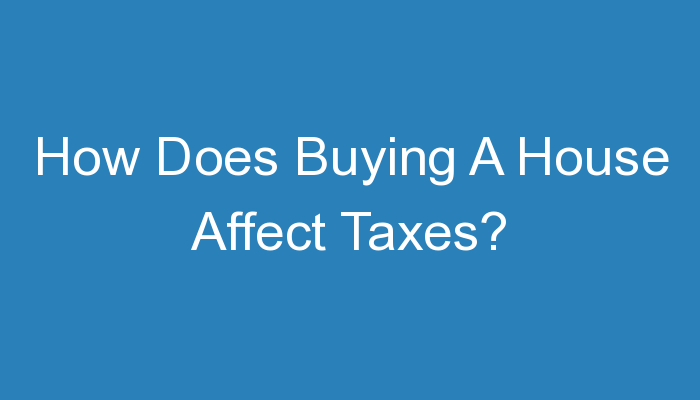Buying a house is a big investment, both financially and emotionally. But it’s not just about the mortgage or even the cost of the property itself; you also need to consider the tax implications. Taxes can be complex and confusing, but understanding how taxes are affected when buying a house will help ensure that you make the best decision for your current and future financial health.
In this blog post, we will explore how buying a house affects taxes. We’ll discuss everything from income taxes to property taxes and more, so that you have a thorough understanding of what to expect when it comes time to file your taxes.
The Mortgage Interest Deduction
The mortgage interest deduction is a tax deduction that allows homeowners to deduct the interest they pay on their mortgage from their taxable income. The deduction is available for both primary and secondary homes, and can be claimed for mortgages of up to $1 million. The amount of the deduction is based on the interest rate of the mortgage, and the term of the loan.
Property Taxes
When you buy a house, you are also responsible for paying property taxes. Property taxes are typically paid to the local municipality in which the property is located. The amount of property tax you will pay is based on the assessed value of your home and the tax rate set by the municipality.
Property taxes can be a significant expense, so it is important to factor them into your budget when considering whether or not you can afford to buy a home. In some cases, property tax bills can be quite high, so it’s important to do your research before buying a home in order to avoid any unpleasant surprises.
Capital Gains Exclusion
The long-term capital gains tax rate is a tax applied to investors who profit from the sale of an asset held for more than one year. The capital gains exclusion allows individuals to exclude a portion of their long-term capital gains from taxation. The exclusion amount is determined by the investor’s tax bracket.
For example, if an investor in the 25% tax bracket realizes a $10,000 long-term capital gain, they would only be taxed on $2,500 of that gain (25% x $10,000). The other $7,500 would be excluded from taxation thanks to the capital gains exclusion.
Other Tax Considerations
In addition to the potential tax implications of buying a house, there are other tax considerations to be aware of. For example, if you’re self-employed, you may be eligible for certain deductions that can offset the cost of your mortgage interest and property taxes. Additionally, if you itemize your deductions, you may be able to deduct some of your closing costs.
Of course, every taxpayer’s situation is different, so it’s always best to consult with a tax professional before making any major decisions. But understanding the basics of how buying a house can affect your taxes can help you make informed choices about whether or not homeownership is right for you.
Conclusion
Owning your own home is a major milestone and should be rewarded with the many tax benefits that come along with it. These benefits can help you save money on taxes and make homeownership much more affordable.
Being aware of how buying a house affects taxes can help you plan for any potential expenses in the future, so it’s important to do your research before making such an investment. With some thoughtful planning, owning a home could end up being one of the best investments you ever make!

